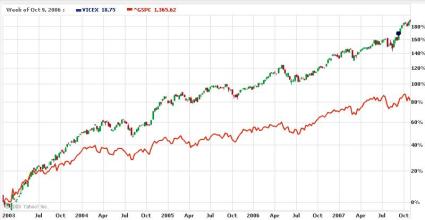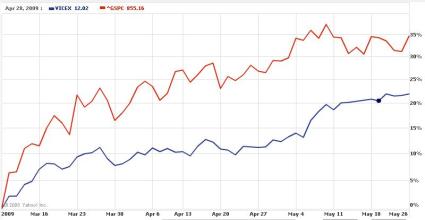Archive for the ‘Culture’ Category
One theme I have been noticing during the downturn has been an uptick of people being “better people”. Many people I know are training for marathons, triathlons, and not engaging in the vices of society as much as say…2005. Perhaps its because I’m getting older, or maybe society is changing. Regardless, I figured I would go to the charts on this one.
Below is a chart of the Vice Fund (VICEX) during the last bull market (which basically started at its inception), compared with the S&P 500:

As has been pointed out in the past, the VICE fund completely killed the S&P during the good times. During this last upswing, however, things have changed.

The S&P 500 has outperformed the VICE fund by nearly 15%, which is a pretty healthy margin.
Does this mean we are having a Vice-less recovery? Only time will tell. We still don’t know if this is, for one, a recovery. Also, it appears that early on during the last recovery, the Vice Fund lagged the S&P for a bit before completely blowing it away. Perhaps as people get more disposable income they tend to allocate it more towards vices and Vice itself outperforms later in the cycle. Only time will tell.
I have been thinking a bit about the music business lately and today came across a great post, The Economics of a $9.99 ebook, on a new blog that I’ve been following Aaron Chua’s Wild Illusions. In this post Aaron argues that a $9.99 price point for an ebook is just not sustainable and the publishers that embrace that reality will be the ones who benefit at the hands of those who hold on the old paradigm. I couldn’t agree more.
When certain types of art such as music and literature/books become digital, the cost to produce such a work rests mostly on the artist. In addition, the Internet has made it easier to discover new artists and for artists themselves to market their work. The result is that the economics of the publishing is dead and the economics of art takes over. To the dismay of the publisher, the economics of art is much different.
The one argument you keep hearing is, “If the artists don’t get paid, how do you expect them to produce the art?”. Art is something that is timeless and will be produced for the sake of art itself. The artist effectively bootstraps him/herself in order to produce it the same way a web publisher with an art for programming can cheaply and quickly make a website or application. Thus the supply of art is much larger than the demand will ever be. An artist just wants to be heard, not bought. Heck, some of the greatest artists that ever existed produced art in their lifetime that they unfortunately never got to “cash out” on. Art will always be mass produced by the masses who wish to express themselves artistically. People find art entertaining and are willing to pay a market price for that. When the production costs rest solely on the artist, the market should clear at a much lower price, and there is nothing to say that this price isn’t “free”.
Historically, publishers (and artists), through marketing and very narrow distribution channels, have received perceived economic rent on art, rent that no longer exists in this digital age. When you restrict the supply of art to key artists, you give the illusion that a particular artist should extract a much larger perceived economic rent on their artistic ability. Any real audiophile will tell you that this is not the case. Sure when it is difficult to find new artists, there is a premium that most people will pay not to have to do it, but these days I feel that we’re inundated with new art and artists that the perceived rent no longer exists.
For the artist, the reality of artonomics will be a double edged sword. For years, the lucky artists were paid outsized rewards for being lucky, for being “found”. Artonomics won’t pay nearly as large of a lucky premium, simply because there will be more lucky artists and competition will be greater and the demand for art/entertainment should stay relatively constant . On the other side of things, there will be greater opportunity for artists to be heard and for artists to get lucky, or found. In addition, more artists being found brings about the concept of “fame” and the ancillary benefits, industries, and opportunities that come with that reality.
So in summary, artonomics should dictate that any digital medium of art should decrease in price as the economics of the artist begins to take over the industry, and the internet should be the facilitator for the reserve army of the starving artist to execute the revolution.
Lately in the media, people have been referring to Twitter as “a Revolution”. While I think its a bit suspect to call something a “Revolution” during the fact, I believe there is reason to believe something something revolutionary is going on.
By Calling it a Revolution You Have Admitted its “Revolutionariness”
A revolution is a fundamental change in power or organizational structures that takes place in a relatively short period of time. Those within the revolution aren’t likely to be the ones calling it a Revolution. Its usually recognized as that by two people: 1) those getting Revolted against, and afterwards 2) historians and the media. I can’t picture the Continental Congress saying “This is a great revolution” and high fiving eachother while writing the Declaration of Independence, but I can picture King George saying “Ahhh Shit! They’re Revolting!” when he read it. So when the mainstream media (who happens to be one of the entities being revolted against) utters the phrase “Twitter Revolution”, it means “There is something revolutionary going and they’re revolting against us. ”
But how is Twitter revolutionary?
Twitter Decentralizes Communication
Twitter decentralizes communication. In doing so, it has brought the concepts behind the First Amendment to this decentralized, global, connected community. In a orwellian world filled with corporatespeak, doublespeak, newspeak, and wiretaps, Twitter says, quite ironically, “Great, we finally found a quiet place to actually talk.” On Twitter the ideals of freedom of speech and press are captured captured through Twitter’s transparency and accountability of the conversation.
Twitter is a Free Market for the Message
Twitter is a free market for the message and the invisible hand keeps out the bullshit. There is no market for spam on Twitter. The “Follow/No Follow” nature of its design has not made Spam marketable. Thats why I laugh when the media talks about it as some revolutionary “PR/marketing tool”. Yes, media, it will be but probably not how YOU think its going to. However for those companies/politicians/celebrities that want to actually TALK to their customers/constituents/fans, it can be revolutionary. Thus, if you are authentic, a good communicator and have a good message you will find yourself rising quickly in the New Guard”.
Twitter is a Statement against Wiretapping and Eavesdropping
In a world where technology is increasingly used to spy on the masses, Twitter allows the masses to throw themselves onto the public stage. In doing Twitter , “Hey asshole! I’ll save you the trouble.” It says “I believe I have the right to say this and I don’t like to be unknowingly spied on – so here you go.” Bluntly put – I think that’s awesome.
So while I don’t want to turn it into a Twitter lovefest (I’m afraid I may be too late), but the more I think about it and use it I do believe it is both a statement and medium for change and when I hear the media call it “A Twitter Revolution”, I think perhaps something revolutionary is going on.
It appears that Delaware may legalize Sports Gambling.
From ESPN:
During his campaign for Delaware Governor last fall Jack Markell often hinted that, if elected, he’d support sports betting in his state. Now that he’s got the job, Markell is done hinting.
ESPN The Magazine has learned that sometime next week, according to a statehouse source, Markell will introduce a proposal which, for the first time in more than 30 years, makes gambling on sports legal east of the Mississippi River. The plan, which could be approved by the state legislature as early as April, would likely be operational come fall, just in time for the NFL season.
Markell’s proposal calls for a statewide sports lottery that only allows parlay bets. In a parlay, gamblers have to get two bets right in order to win. It’s an idea that has been brewing in Delaware for a while, long before the economy imploded and the state found itself with a budget shortfall of $700M. In fact, a proposal to allow gambling on sports died in the state legislature last year, when then governor Ruth Ann Minner made it clear she’d veto a resulting bill.
I will BET you that within 2-3 years there will be the equivalent of Ladbrokes in the middle of Times Square – I think Bloomberg shutting down the OTB’s was clearing the path for something like that to move in. As states need money they will turn to legalizing all the “sins” including gambling.
Moreover, I find it interesting that Delaware is interested in legalizing it. As many banks are Delaware companies, I wonder if this paves the way for some sort of move by the traditional financial exchanges into some of the betting/prediction market exchanges. Time will tell




